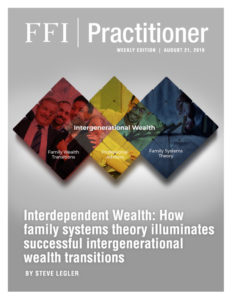
View this edition in our enhanced digital edition format with supporting visual insight and information.
Thanks to this week’s contributor, Steve Legler, for highlighting key concepts in his recently released book, Interdependent Wealth: How Family Systems Theory Illuminates Successful Intergenerational Wealth Transitions, on relationships between family wealth and family systems theory.
For the last five years, I have been exploring the intersection of two areas of family enterprise study in which I have great interest: family wealth and family systems theory. In this article, I focus on three overlaps where the worlds of family wealth and family systems theory intersect.
Overlap 1: Put Me In, Coach
When a family is working on the details of transitioning its wealth from the current generation of leaders to the next generation, a variety of situations arise where the perspective and input of an objective outsider who is a professional advisor could benefit the family.
Professional advisors from outside the family enterprise system each bring their own particular experience and expertise and typically can provide an advantageous perspective. Some professional advisors describe themselves as a resource for the family, especially in terms of explaining the previous work they or others have done on behalf of the family.
In some cases, professional advisors within the system are more than adequate to help the family transition its wealth to the next generation, and it is often worth trying these advisors as a first step. Sometimes, however, whether due to the size of the family, its complexity, or the fact that there are previously identified touchy subjects to deal with, it is advisable to look for someone outside the system – someone who is trained specifically in dealing with family systems and dynamics. In other words, a coach.
As the coaching profession continues to evolve and become more accepted in society, there have been growing pains, especially with regard to the standards for calling oneself a “coach.” Nonetheless, a coach can be a good resource for families of wealth facing the challenges of leadership transition. As with hiring any professional, the family would be wise to ask questions, check references, and do basic research online before deciding to hire a coach to work with them.
Overlap 2: How Can’t I Help You?
When clients receive help from someone, they sometimes have difficulty recognizing and admitting it –barely noticing, taking the help for granted, and even rationalizing the assistance provided. Many of these “helping” situations are relatively benign on the surface. Often there is interdependence or reciprocity. Each person gets something out of it.
However, it can be difficult to admit that one receives too much help – or gives to much help. This can be especially hard to admit to oneself. For example, parents who are doing too many things for their children might find it challenging to acknowledge that they are “over-helping” in these situations.
An ideal metaphor scenario for parents and their adult offspring could be an undergraduate class in which students are treated as if they are on the same level as the instructor. However, many adult family gatherings are anything but a group of equals.
Another example: some family gatherings include family members who see themselves as either “one up” or “one down” when compared to their relatives. The one-ups usually think they are helping the group with their “superior” ideas and input, while the one-downs have usually resigned themselves to positions of helplessness.
One day I was on a call with a Bowen Theory coach, and I was sharing with her a situation involving my wife and her family. I told her that I could see some areas where my wife’s family could benefit from my assistance and that I wanted to help.
Then came the ah-ha moment: great coaches usually make their biggest impact not with a statement, but instead with a question. My coach said, “What if you didn’t help your wife? What if you were just a resource for her?” The coach didn’t use the term “intrusive helpfulness” at the time, but that’s definitely what she was encouraging me to stop offering.
After our call, I went to my wife and told her that I was not going to help her with her family situation anymore. She gave me a quizzical look, and said, “Okay…,” waiting for the punchline. I couldn’t leave her hanging so I added, “But if you ever need me as a resource, I will always be there for you.”
Since that time, I have tried to banish the word “help” from my vocabulary. In my experience, a majority of the help being offered comes from the “one-up” perspective, where the helper sees himself or herself as a rescuer of someone who would be otherwise helpless without the assistance.
Overlap 3: Perpetuation
When a family system is in equilibrium, relationships are typically relatively stable. The family has found a working way to relate to each other, even if some family members are more satisfied than others. Over time, however, things can and do change.
Membership in a family enterprise system is fluid, by the very nature that people come and go. Whenever someone is born into a family, the system changes. That person may be decades away from having any direct effect on family dynamics, but as soon as he or she arrives, the system is composed differently than before.
Family members also eventually exit the system when they pass away. While it is true that some people continue to cast a large shadow, even from the grave, when people pass away, the system is forever changed.
People can enter and exit family systems in other ways as well, notably through marriage, partnerships, and divorce.
If you know all four of your grandparents’ names, you are probably doing better than average. Some students of Bowen Theory suggest that their clients go back and investigate to get as much information about their ancestors as possible.
I think that when we look back to our parents and grandparents, we capture most of what is salient in the lives we are living today. Likewise, if we look at our children and eventually their children, that’s about as far as anyone can hope to readily assess or provide influence since it includes four to five generations.
Concluding Thoughts
The key thing that I advise families to work on in these overlap areas is to ensure that the next generation of leaders is prepared for the wealth they will be inheriting. What that means is making sure the human capital is the focus of the work and the planning.
Are the members of the rising generation capable of managing the assets they will be expected to manage? Are they able to work together to make the decisions and solve the problems they will be confronted with?
Of course, it makes sense to look at structures and methods to save on taxes that will be owed as the current generation exits the system, and those types of tactics are certainly worth exploring. But I believe that the overall strategy employed to perpetuate a family’s wealth must be centered around the people involved and on finding ways to increase the odds that they will be able to maintain and build the family wealth together.
About the Contributors

Steve Legler is a family legacy advisor based in Montreal, Canada. He works with family clients as a facilitator, and sometimes as a mediator. He also does individual coaching with family members. Steve holds advanced certificates in Family Business (CFBA) and Family Wealth Advising (CFWA) from FFI. He is the author of SHIFT your Family Business (2014) and the recently released Interdependent Wealth: How Family Systems Theory Illuminates Successful Intergenerational Wealth Transitions (2019). Steve can be reached at steve@familylegacyshift.com.

View this edition in our enhanced digital edition format with supporting visual insight and information.





